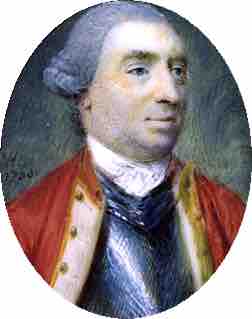Lord George Germain served as Secretary of State for America during the Revolutionary War. He was the primary architect of British strategy in the Revolutionary War, working closely with British Prime Minister Lord Frederick North. In addition to strategic planning, Germain was responsible for promoting and relieving generals, and distribution of provisions and supplies. Germain's poor understanding of the geography of the colonies and the terrain of North America were great disadvantages. Germain and North also underestimated the strength of the colonists. Following the war, Germain's ministry received much of the blame for Britain's loss of the 13 American colonies.
In 1775, British forces were sent to America to put down what was initially expected to be a short-lived rebellion. Because the British army was understaffed at the outset of the war, the British government hired the armed forces of several German states. These allies supplied roughly 30,000 soldiers, or approximately one-third of British forces in North America. These German soldiers became known as "Hessians" to the Patriots and were viewed as mercenaries. By 1779, the number of British and German troops stationed from Canada to Florida was over 60,000. The ministry also sought to recruit Loyalist soldiers with limited success. The British never found the amount or quality of Loyalist support in the colonies they had anticipated.
Maintaining capable leadership was a challenge for the British throughout the war. General Thomas Gage, in command of British forces in North America during the early rebellion, suffered criticism for his leniency. Many speculated that he harbored sympathies for the Patriots due to the influence of his American wife. Several senior British officers turned down appointments or publicly resigned commissions because they chose not to take sides in the conflict, including General Jeffrey Amherst and Admiral Augustus Keppel. William Howe and Henry Clinton, officers with prominent roles in the war, publicly declared that they were unwilling participants and merely following orders. In general, Whig politicians were vehemently opposed to the Tory plan for militarily suppressing the colonial rebellion, causing great divisions within Parliament. As the British army suffered strategic defeats in battles such as Saratoga and Yorktown, the Whigs’s gained prominence within Parliament and Lord North’s ministry began to collapse.
Though the British defeated the colonists in a majority of the battles of the Revolutionary War, these victories rarely achieved decisive results. Conversely, the British defeats at the Battle of Saratoga and Siege of Yorktown had a strongly negative impact on British morale, prestige, and manpower. Aside from the problems inherent in the under-staffing of their troops and logistical distance from the battlefields of North America, there were other strategic and psychological factors that prevented the British from achieving outright victory. First, there was no central area of strategic importance necessary to gain victory in the colonies, unlike many of the European conflicts the British army was accustomed to fighting. So although the British were able to capture large cities such as New York, Philadelphia, or Boston, none of these strategic victories were enough to decisively end the war in British favor. The colonies had not been centralized prior to the war and British forces on the ground were not sufficient to both occupy captured land and cover territories not yet subdued stretching from Canada to Florida. Therefore, many Patriot defeats were quickly reversed on the ground when Patriot militia occupied formerly captured land because British regulars could not sufficiently cover the area. The manpower shortage became even more critical when France, Spain, and the Netherlands entered the war on the side of the colonies.
The British were also hindered by the need to maintain Loyalist allegiance on the ground, which prevented them from utilizing harsh methods for suppressing the Patriot rebellion as they had already done in similar situations that had arisen in Ireland and Scotland. Because Loyalists came from the same communities as Patriots, extreme measures could not be taken on the ground for fear of alienating local support for the British crown. Nonetheless, many neutral colonists were driven to the Patriot cause as a result of heavy brutality, making a single American victory on the battlefield more psychologically significant to Patriot morale and support than a string of British successes in the long term.

George Germain, 1st Viscount Sackville by Nathaniel Hone the Elder, 1766
As Secretary of State for the American Department, Germain was largely responsible for British strategy in the Revolutionary War.